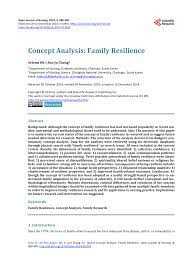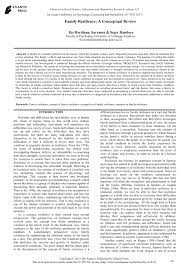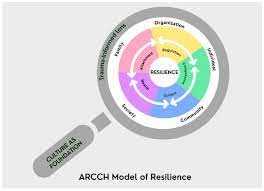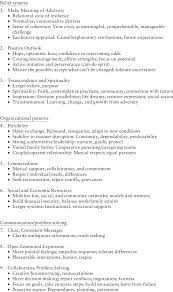
In today’s fast-paced and ever-changing world, families face numerous challenges and adversities that can put a strain on their relationships. Coping with these stressors requires a deep understanding of family dynamics and the ability to build resilience. Family Stress and Resilience Theory provides a framework for understanding how families navigate through difficult times and emerge stronger.
At the core of this theory is the recognition that families are complex systems, where each member plays a unique role. Coping with stress and building resilience requires a strong bond and support system within the family unit. By fostering open communication, trust, and understanding, families can develop the tools needed to overcome adversity.
Resilience, a key concept in this theory, refers to the ability to bounce back from difficult situations. It involves not only the individual’s ability to cope with stress but also the family’s collective strength. Building resilience requires identifying and utilizing resources within the family and the broader community.
Understanding Family Stress and Resilience Theory can help families develop strategies for building stronger relationships and navigating through challenging times. By recognizing the impact of stress on family dynamics, families can proactively work towards creating a supportive and nurturing environment. This involves fostering healthy coping mechanisms, promoting emotional well-being, and seeking external support when needed.
Understanding Family Stress and Resilience Theory

In the field of family studies, understanding the impact of adversity and stress on families is crucial. Family stress theory provides a framework for understanding how various stressors can affect family relationships and dynamics. The theory suggests that families experience stress when they face external demands and internal challenges that exceed their resources and coping mechanisms.
Adversity and stress can take many forms, such as financial difficulties, health problems, parenting challenges, and conflicts within the family. These stressors can disrupt the functioning of the family and strain relationships between family members. Family stress theory emphasizes the importance of understanding the unique experiences and perspectives of individuals within the family.
Resilience theory complements family stress theory by focusing on the capacity of families to bounce back and adapt in the face of adversity. Resilient families are able to maintain positive relationships, effective communication, and a sense of cohesion and bonding, even in the midst of stress. They have the ability to cope with challenges and find solutions that strengthen their relationships and overall well-being.
Building resilience in families involves developing strategies and skills to effectively manage stress and adversity. This can include fostering open and honest communication, promoting empathy and understanding, and encouraging problem-solving and decision-making skills. It is also important for families to seek support from their social networks, community resources, and professional services when needed.
Understanding family stress and resilience theory can help professionals and individuals alike in supporting families facing challenging circumstances. By acknowledging the impact of stress and adversity on family dynamics and relationships, we can work towards building stronger, more resilient families.
Exploring the Impact of Stress on Families
Stress is an inevitable part of life, and it can have a significant impact on families. Coping with stress can be challenging, especially when it affects multiple family members. When families experience stress, it can put a strain on relationships and disrupt the overall dynamic.
One of the key factors in understanding the impact of stress on families is the level of support available. Families that have strong support systems in place are better equipped to navigate through difficult times. Support can come from various sources, including friends, extended family, and community organizations.
Adversity and stress can test the resilience of families. Resilience theory suggests that families have the ability to bounce back and adapt to challenging circumstances. This theory emphasizes the importance of building resilience through bonding and strengthening relationships within the family unit.
Stress can affect family dynamics in different ways. It can lead to increased conflict and tension, as well as a breakdown in communication. Additionally, stress can impact the emotional well-being of family members, causing feelings of anxiety, depression, and frustration.
Exploring the impact of stress on families is crucial for developing strategies to support and strengthen them. By understanding how stress affects families, professionals and individuals can implement interventions and support systems that promote resilience and improve overall well-being.
The Role of Stress in Family Dynamics

Family dynamics are heavily influenced by the presence of stress. Stress can arise from various sources, such as work pressures, financial difficulties, or health issues. These stressors can significantly impact family relationships and bonding.
Family Stress and Resilience Theory suggests that stress is a natural part of family life and can be both positive and negative. Positive stress, also known as eustress, can promote growth and development within the family unit. It can encourage families to adapt and find effective coping strategies to overcome adversity.
However, excessive or chronic stress can have detrimental effects on family relationships. It can lead to increased conflict, communication breakdowns, and strained interactions. The constant pressure can erode the sense of trust and support within the family, making it challenging to maintain strong and healthy connections.
Resilience plays a vital role in mitigating the negative impact of stress on family dynamics. Resilient families are better equipped to handle and bounce back from stressful situations. They have strong coping mechanisms and effective problem-solving skills, allowing them to navigate through challenging times without significant disruptions to their relationships.
Building resilience within families involves fostering open communication, promoting empathy and understanding, and providing a supportive and nurturing environment. It is crucial for family members to recognize and validate each other’s emotions and experiences, creating a safe space for expression and vulnerability.
Additionally, families can benefit from seeking external support, such as therapy or counseling, to learn healthy coping strategies and improve their resilience. Professional guidance can help families identify and address underlying issues contributing to stress and provide tools to enhance their ability to adapt and thrive.
In conclusion, stress plays a significant role in family dynamics. While some stress can be beneficial, excessive or chronic stress can strain relationships and hinder bonding. Resilience is essential in mitigating the negative impact of stress and fostering stronger families. By developing effective coping strategies and seeking support when needed, families can navigate through adversity and build lasting connections.
Common Sources of Stress in Families

In understanding family stress and resilience theory, it is important to recognize the common sources of stress that families may encounter. These sources of stress can have a significant impact on the relationships within a family and their overall resilience.
One of the primary sources of stress in families is the dynamics and complexities of family relationships. The interactions between family members can sometimes be challenging, leading to conflicts and tension. These relational stressors can arise from various factors, such as differences in values, communication breakdowns, and conflicting expectations.
Another source of stress in families is the presence of adversity and challenges. Families may face financial difficulties, health issues, or other external pressures that can strain their resilience. These adversities can create additional stress and place a burden on family members who may be struggling to cope.
Lack of support can also be a significant source of stress in families. When families do not have access to adequate support systems, it can be challenging to navigate through difficult times. Support can come in various forms, such as emotional support from friends and extended family, or practical support in terms of childcare or financial assistance.
Furthermore, the bonding and attachment theory suggests that disruptions in the bonding process between family members can lead to stress. For example, if there is a breakdown in the parent-child relationship, it can create tension and stress within the family unit. The quality of these relationships plays a crucial role in the overall well-being of family members.
Overall, understanding the common sources of stress in families is essential in developing strategies to build stronger and more resilient families. By recognizing and addressing these stressors, families can work together to overcome challenges and strengthen their relationships.
The Definition and Components of Resilience

Resilience is a concept that is central to the understanding of family stress and coping. Resilience refers to the ability of individuals, families, and communities to bounce back and thrive in the face of adversity or stress. It is the ability to adapt and recover from difficult experiences, maintain positive relationships, and function effectively in the face of challenges.
The theory of resilience suggests that individuals and families have the capacity to develop resilience through various components. These components include:
- Positive relationships: Building and maintaining positive relationships with family members, friends, and other supportive individuals is crucial for resilience. These relationships provide emotional support, encouragement, and a sense of belonging.
- Coping skills: Developing effective coping skills is essential for resilience. Coping skills help individuals and families manage stress, solve problems, and adapt to change. They can include strategies such as problem-solving, communication, and self-care.
- Supportive family environment: A supportive family environment is characterized by open communication, trust, and mutual respect. It provides a safe and nurturing space for individuals to express their thoughts and emotions, seek help, and receive support.
- Bonding: Bonding refers to the emotional connection and attachment between family members. Strong family bonds contribute to resilience by providing a sense of security, stability, and love.
- Access to resources: Resilient individuals and families have access to various resources, such as financial resources, educational opportunities, and community support. These resources can help them navigate challenges and overcome adversity.
Understanding the definition and components of resilience is essential for building stronger families. By fostering positive relationships, developing coping skills, creating a supportive family environment, nurturing bonding, and accessing resources, families can enhance their resilience and effectively navigate the stressors of life.
How Resilience Can Help Families Overcome Stress

Resilience is a crucial concept in understanding how families can overcome stress and adversity. It refers to the ability of individuals and families to bounce back and adapt in the face of challenges, setbacks, and difficult circumstances. Resilience is particularly important in the context of family stress, as it can help families maintain healthy relationships and strong bonds despite the challenges they may face.
When families experience stress, such as financial difficulties, health problems, or relationship conflicts, it can put a strain on their overall well-being and functioning. However, families that possess strong resilience skills are better equipped to cope with these challenges and navigate through difficult times. Resilient families are able to maintain a sense of stability and support, even in the face of adversity.
One way that resilience can help families overcome stress is by promoting effective coping strategies. Resilient families are more likely to engage in problem-solving and seek out support from others when faced with challenges. They are able to identify and utilize available resources and support networks to help them navigate through difficult situations. This can include seeking professional help, reaching out to friends and family, or participating in support groups or therapy sessions.
Another way that resilience can help families overcome stress is by fostering positive relationships and bonding. Resilient families prioritize communication, empathy, and understanding, which helps to strengthen their relationships and create a sense of unity. This strong bond can provide a buffer against stress and adversity, as family members can lean on each other for support and understanding.
Resilience is not only important for individual family members but also for the family as a whole. When families possess resilience, they are better able to adapt and adjust to changing circumstances, which can help them overcome stress and maintain their overall well-being. Resilient families are more likely to have a positive outlook, maintain a sense of hope, and view challenges as opportunities for growth and learning.
| Key Points: |
|---|
| – Resilience is the ability of families to bounce back and adapt in the face of stress and adversity. |
| – Resilience helps families cope with challenges and maintain healthy relationships. |
| – Resilient families utilize effective coping strategies and seek support from others. |
| – Resilience fosters positive relationships and bonding within families. |
| – Resilient families have a positive outlook and view challenges as opportunities for growth. |
Strategies for Building Stronger Families

Adversity and stress are inevitable parts of life, and families are not immune to them. However, by understanding family stress and resilience theory, families can develop strategies to build stronger bonds and cope with the challenges they face.
One key strategy is to prioritize family bonding. Spending quality time together, engaging in activities that promote communication and connection, can help strengthen family relationships. This can include regular family meals, game nights, or outings to enjoy shared interests.
Another important strategy is to develop coping skills. Teaching family members effective ways to manage stress and adversity can help build resilience. This can involve teaching children and adults alike techniques such as deep breathing, mindfulness, or journaling to express emotions.
Seeking and providing support is also crucial. Families can benefit from reaching out to others for guidance and assistance during difficult times. This can include seeking professional help, joining support groups, or relying on friends and extended family for emotional support. Additionally, offering support to other family members can strengthen bonds and create a sense of unity.
Finally, it is important to remember that building stronger families is an ongoing process. It requires open communication, flexibility, and a willingness to adapt to changing circumstances. By continuously working on these strategies, families can develop the resilience needed to thrive in the face of adversity.
In conclusion, understanding family stress and resilience theory can provide valuable insights into how families can build stronger bonds and cope with stress. By prioritizing family bonding, developing coping skills, seeking and providing support, and maintaining open communication, families can enhance their resilience and overcome challenges together.
Effective Communication and Conflict Resolution

The theory of family stress and resilience highlights the importance of effective communication and conflict resolution in coping with adversity and building stronger families. In times of stress, such as financial difficulties or health issues, effective communication becomes even more crucial for maintaining healthy family relationships.
Communication is the foundation of any relationship, and it plays a vital role in family dynamics. Open and honest communication allows family members to express their needs, concerns, and emotions, fostering understanding and empathy. It helps in resolving conflicts and prevents misunderstandings from escalating into larger issues.
Conflict is a natural part of family life, and how it is handled can determine the level of resilience within the family unit. Effective conflict resolution involves active listening, empathy, and compromise. It requires family members to communicate assertively and respectfully, without resorting to aggression or passive-aggressive behavior.
During times of stress, conflicts can arise more frequently, and tensions may run high. It is important for families to establish strategies for managing conflict in a healthy and constructive way. This can include setting aside dedicated time for family meetings or discussions, where everyone has an opportunity to voice their concerns and work towards solutions together.
Supportive communication is also essential during times of stress. Family members can provide emotional support and validation to one another, helping to alleviate stress and build resilience. Active listening and offering words of encouragement can go a long way in strengthening family bonds and promoting a sense of unity.
Furthermore, effective communication and conflict resolution can help families navigate external stressors and challenges. By openly discussing their feelings and concerns, families can seek support from one another and develop coping strategies together. This shared understanding and collaboration can enhance the family’s ability to adapt and bounce back from adversity.
In conclusion, effective communication and conflict resolution are fundamental aspects of building stronger families and promoting resilience in the face of stress. By fostering open and honest communication, families can strengthen their relationships, provide support during difficult times, and develop strategies for coping with adversity.
The Importance of Support Networks

In the context of family relationships, bonding, coping with stress, and overcoming adversity, support networks play a crucial role. These networks consist of individuals or groups that provide emotional, practical, and informational support to families in times of need.
Family stress and resilience theory emphasizes the significance of support networks in promoting family well-being and enhancing their ability to cope with challenging situations. Research has shown that families with strong support networks are more likely to experience lower levels of stress and higher levels of resilience.
Support networks can include extended family members, close friends, neighbors, community organizations, and professional services. These networks offer various forms of support, such as listening and offering advice, providing practical assistance, and offering emotional comfort.
When families face stressful events or difficult circumstances, the presence of a support network can provide a sense of belonging and validation. It can also offer a space for families to share their experiences, express their emotions, and seek guidance from others who have gone through similar situations.
Moreover, support networks can help families access additional resources and services that they may need during times of stress or adversity. These resources can include counseling services, financial assistance, childcare options, and educational programs.
Building and maintaining strong support networks is essential for families to thrive and overcome challenges. It requires cultivating relationships, fostering open communication, and actively seeking out support when needed. Families can also benefit from participating in support groups or community activities that promote social connections and provide a sense of belonging.
In conclusion, support networks are vital for families’ well-being and resilience. By nurturing these networks, families can strengthen their coping abilities, navigate through stressful situations, and find the support they need to thrive.

I am Patrina de Silva, a psychologist and mental health blogger in Sri Lanka. After obtaining psychology degrees from the University of Colombo and Monash University, I returned home to work as a counselor while also starting the popular blog “Pressy but Happy” to provide advice on psychological issues. Over the past decade, my empathetic articles have made my blog a leading mental health resource in the country. In addition to writing, I maintain a private therapy practice, frequently volunteer counseling time, and conduct seminars, driven by my passion for destigmatizing mental illness and educating the public on the mind-body connection. I strive to be an influential voice in my field through my compassionate approach.
